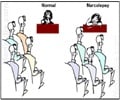Treating hospitalized cardiac patients with positive airway pressure therapy can lead to lower rates of 30-day hospital readmission.

Results show that none of the cardiac patients with sleep apnea who had adequate adherence to PAP therapy were readmitted to the hospital or visited the emergency department for a heart problem within 30 days from discharge. In contrast, hospital readmission or emergency department visits occurred in 30 percent of cardiac patients with sleep apnea who had partial PAP use and 29 percent who did not use PAP therapy.
"Finding a reduced 30-day cardiac readmission rate in PAP-adherent patients is important for improving both patient care and hospital finances," said principal investigator and senior author Dr. Richard J. Schwab, Professor in the Department of Medicine and co-director of the Penn Sleep Center at the University of Pennsylvania Medical Center in Philadelphia.
The study results are published in the Oct. 15 issue of the Journal of Clinical Sleep Medicine, which is published by the American Academy of Sleep Medicine.
"Severe sleep apnea is solidly associated with serious cardiovascular outcomes, such as heart failure, heart attacks, and heart-related deaths," said American Academy of Sleep Medicine President Dr. Timothy Morgenthaler, a national spokesperson for the Healthy Sleep Project. "This study is a clarion call to detect, diagnose, and especially to treat sleep apnea in patients who are hospitalized for heart problems. Doing so is a win-win-win move; it improves the patient's quality of life, improves health outcomes, and reduces the resources used to manage heart diseases."
The "Stop the Snore" campaign was launched recently to encourage people to talk to a doctor about the warning signs for obstructive sleep apnea, which afflicts at least 25 million adults in the U.S. Sleep apnea warning signs include snoring and choking, gasping or silent breathing pauses during sleep. Pledge to stop the snore at www.stopsnoringpledge.org.
Advertisement
Participants who were diagnosed with sleep apnea were started on PAP therapy, and compliance data were collected via modem or data card. Adequate treatment adherence was defined as using PAP therapy four or more hours per night on at least 70 percent of nights. Thirty-day hospital readmission was defined as a hospitalization or visit to the emergency department for a cardiac cause more than 48 hours after discharge.
Advertisement
Source-Eurekalert















